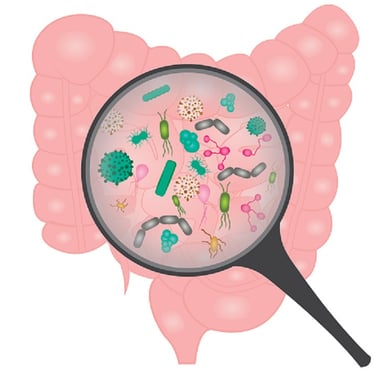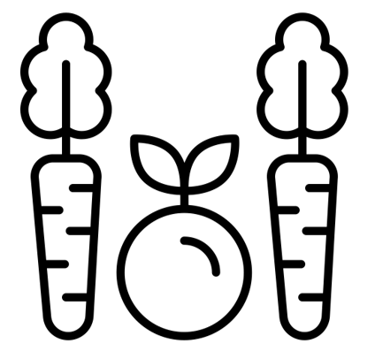SIBO, the key to intestinal issues?


SIBO (Small Intestine Bacterial Overgrowth) is a problem that can be managed, but it's a complex one
I'll explain it in this (long) article but be aware that it’s best to see a doctor or nutritional therapist.
SIBO is the cause of many intestinal problems. It’s a bacterial overgrowth in the small intestine, the part of the intestine that ensures the absorption of nutrients. There can't be too many bacteria in this part. It’s rather in the colon, after the small intestine, that bacteria must be present in large numbers to ferment what has not been absorbed. In a SIBO, bacteria from the colon have moved up into the small intestine, starting their fermentation work too high and too early.
SIBO is problematic because it causes inflammation of the intestinal mucosa. This reduces its ability to absorb nutrients, leading to deficiencies and issues resulting from these deficiencies. Other symptoms and consequences include digestive discomfort (bloating, flatulence, belching, abdominal pain, diarrhea) and intestinal hyperpermeability, leading to food intolerance, among other things. Bacteria from the colon also consume vitamin B12 before it can be absorbed into the bloodstream, resulting in a deficiency that can cause severe fatigue, memory, and sleep problems.
There are three main causes of SIBO:
Slowed intestinal motility. It can occur in particular after an intestinal infection such as gastroenteritis, and can be diagnosed by a test known as the IBS Smart Test.
A digestive issue, such as reduced gastric activity, which causes poorly digested food to reach the small intestine (it may be the result of taking proton pump inhibitors for acid reflux or gastric ulcers, or of a state of chronic stress), or gluten intolerance.
A mechanical obstruction of the small intestine, usually following abdominal surgery such as Caesarean section, hysterectomy, endometriosis reduction, or gastric bypass.
Alongside these causes, there are aggravating factors linked to lifestyle: bad diet, lack of exercise, lack of sleep and chronical stress.
Ideally, to diagnose SIBO, we would take a biopsy of the small intestine to analyze the bacterial flora, but this is highly invasive. The best method at present is a breath gas test, for hydrogen and methane. Whether the person exhales too much hydrogen or too much methane, or both, is an important indication for the therapist. Exhalation of hydrogen sulfide is also important information, even if it is not directly measured but can be inferred from the results. Stool analyses, urinary metabolite measurements and blood tests can also provide useful information, both in terms of diagnosis and management.
When it comes to managing SIBO, you need to act in stages and on several levels:
Follow a diet free of soluble fibers (e.g., cooked vegetables) and fermentable carbohydrates (e.g., legumes) for one to three months. You can find online lists of fermentable carbohydrates known as FODMAPs (Fermentable by colonic bacteria Oligosaccharides, Disaccharides, Monosaccharides And Polyols). For mild to moderate SIBO, this eviction works well to reduce the number of bacteria in the small intestine. For severe SIBO, other carbohydrates may also need to be eliminated.
Beware, in people in whom SIBO has favored the development of histamine intolerance, a FODMAPs-avoidance diet can intensify this intolerance, with a whole range of symptoms, not only gastrointestinal, but also respiratory, nervous, cardiovascular, and dermatological. In such cases, a low-histamine diet should be adopted, involving the avoidance of both histamine-rich and histamine-releasing foods. When symptoms improve, foods rich in histamino-liberators can be reintroduced, and when symptoms continue to improve, histamine-rich foods can also be reintroduced one by one. Histamine elimination can be enhanced by sufficient intake of the nutrients that support methylation and synthesis of the enzyme diamine oxidase.
Also note that a FODMAP-avoidance diet is not indicated in cases of SIBO with excess hydrogen sulfide. In this case, a low-sulfur diet is more effective, i.e., a plant-based diet (no dairy products, meat, eggs, fish, or seafood), combined with the avoidance of cruciferous vegetables, wine, dried fruit, garlic, onions, and radishes.
An antibacterial treatment. The antibiotic Rifamixin is highly effective with few side effects, but it’s expensive (and it’s not recognized in Europe as an indication for SIBO). There are, however, natural alternatives. One can use the protocol of Dr. A. Siebecker, based on a combination of herbs including berberine, neem, oregano essential oil and allicin:
In case of excess hydrogen production: combine two or three of these four plants.
In case of excess methane production: combine allicin with one or two of the other three plants.
In the event of excess hydrogen sulfide production: do not take compounds containing sulfur, i.e., no berberine or allicin. Instead, take oregano essential oil, bismuth (2 g/day, divided into two or three doses), zinc acetate and the Lactobaccilus plantarum probiotic.
Caution: the use of antibacterial plants can lead to flu-like symptoms and worsening digestive disorders, as a result of the immune system's reaction to the bacterial fragments released by the bacteria killed by these plants. In such cases, doses should be reduced, or the treatment interrupted for a few days, and then gradually increased again. It's also important to know that several courses of treatment with these plants, spaced two to three months apart, may be necessary to achieve a complete cure. Their dosages are:
Berberine: 3 to 5 g/day, preferably via a complex of different berberine-containing plants (e.g., goldenseal, coptis, turmeric tree, Oregon grape, philodendron, berberis, California Anemopsis).
Neem: 900 mg to 1.8 g/day, divided into three doses.
Oregano essential oil: 3 drops, either in neutral capsules or in a little honey, 3x/day outside meals.
Allicin (concentrated garlic extract): 450 to 900 mg, 3x/day.
It may help to support digestion with digestive enzymes and/or to strengthen the intestinal wall with glutamine and other nutrients.
You need to avoid certain medications that reduce the small intestine's ability to clean itself properly: proton pump inhibitors, which should ideally be weaned off, but also opiates, antispasmodics and tricyclic antidepressants.
Once antibacterial treatment has been discontinued, you need to take prokinetics, preferably natural ones), either for six months if symptoms have lasted no more than a year, or for longer.
You should also address any aggravating factor: bad diet, lack of exercise, lack of sleep, chronical stress.
Unfortunately, relapses are frequent, so protective measures need to be put in place. In terms of diet, these include spacing food intake at least four hours apart, and ensuring a fasting period of at least 12 hours between the last food intake of one day and the first food intake of the following day. It may also be necessary to continue stimulating intestinal motility by taking prokinetics. Finally, caution should be exercised when traveling abroad and probiotics and/or antibacterial herbs in small doses should be taken on an ongoing basis.
To find out more, also read these articles:
On the microbiota: https://isabellemaesnutrition.com/en/microbiota
On intestinal dysbiosis and hyperpermeability: https://isabellemaesnutrition.com/en/processed-foods
SIBO drawing by iStock/Olena Troshchak
